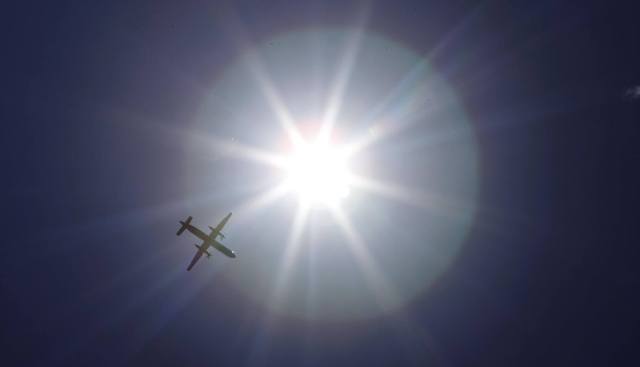Danny Lawson/PA Archive/PA Images

Planning to go somewhere hot this summer? Well, it’ll be all the hotter for you going there – or at least it will according to a new analysis on the impact of tourism on global warming. Kate Wheeling of the Pacific Standard reports on the findings:
“A new study, out today in Nature Climate Change, finds that global emissions from tourism are over three times higher than previously thought.
“Global tourism is a $1.2 trillion industry, and it’s growing every year. Previous estimates of the tourism industry’s carbon footprint put it at between 2.5 and 3 percent of total global carbon dioxide emissions.”
The study calculates emissions for all the goods and services involved in tourism, not just the transport element.
The good news is that a lot of that can be decarbonised. For instance, Costa Rica – a leading ‘eco-tourism’ destination is, according to the Independent, set to become the world’s first fossil-fuel-free economy.
Except that the eco-tourists flying into the tropical paradise are doing so on a fossil fuel dependent form of transport. Indeed, air travel is one the biggest obstacles to decarbonising the global economy.
With no technological solutions on the horizon, we have no choice but to artificially constrain demand, says Sonia Sodha in the Guardian. But how?
“…increasing the government levies on air travel – forcing up prices to get people to fly less – isn’t the answer. This would have little impact on the most affluent travellers, while hitting the poorest in society… Instead we should look to carbon trading schemes for inspiration…
“Everyone could be given an air mile allowance – say enough for one long-haul return flight a year, or three short-haul flights, so people with families on the other side of the world could see them once a year. If you don’t want to use your allowance, you could sell it off in a government-regulated online marketplace. If you’re keen to do a holiday a month, you’ll have to buy your allowance from someone else.”
Sodha’s proposal has provoked cries of ‘rationing!’ from free marketeers; but what is the free market if not a means of rationing the distribution of scarce resources through the price mechanism?
Our ability to spew out greenhouse gases without screwing up the climate is also a scarce resource. It isn’t automatically priced by the market because no one owns the global climate (especially not those who’ll have to live with it in 50 or 100 years time).
If, however, government steps in to price the resource, then the market can do its thing. Free marketeers shouldn’t have a problem with the ‘invisible hand’ getting a helping hand.
In any case, Sodha’s proposal doesn’t actually ration the number of flights per person, but rather the number of flights each person can take without having to purchase someone else’s allowance. As long as you can pay, you can fly as much as you like.
The real problem with it, though, is that it isn’t nearly as fair to the poor as she thinks it is. In theory, it avoids the unfairness of pricing them out of the skies completely. In practice, however, there’d still be a cost to flying – in this case the opportunity cost of using an allowance instead of selling it. As with all financial costs, this would be felt most heavily by those with the least money.
Admittedly, Sodha’s system would give the poor a source of income – which would surely be fairer than a tax or a levy whose revenues would fill the state’s coffers. Or would it?
In London, as in other cities, road congestion charges help to fund public transport – to the disproportionate benefit of the poor. A carbon tax on air travel could be used to benefit the very poorest people in the world – such as those already suffering as a result of climate change. Arguably, this would be more equitable, and more efficient, than a complex system of tradable permits that transfers wealth from flyers to non-flyers irrespective of their incomes.
The irony of the Sodha’s proposal is that both sides have got it wrong – it isn’t contrary to market principles, but nor is it necessarily fair.










Join the discussion
Join like minded readers that support our journalism by becoming a paid subscriber
To join the discussion in the comments, become a paid subscriber.
Join like minded readers that support our journalism, read unlimited articles and enjoy other subscriber-only benefits.
Subscribe